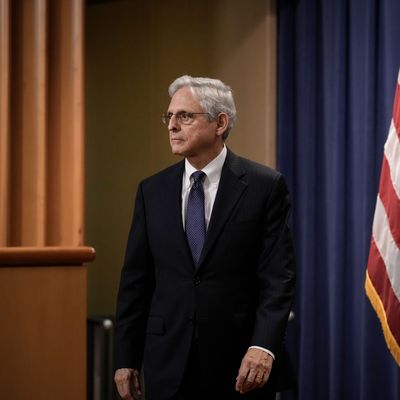
Attorney General Merrick Garland said in a surprise briefing that the Justice Department has asked a court to unseal the warrant he personally authorized for federal agents to search Donald Trump’s Mar-a-Lago home, just as Trump himself requested while he claims to be the victim of a baseless raid.
“The department filed the motion to make public the warrant and receipt in light of the former president’s public confirmation of the search, the surrounding circumstances, and the substantial public interest in this matter,” Garland said on Thursday, minutes after the motion was filed in the Florida federal court that approved the FBI’s search. The motion seeks to unseal the warrant and a receipt of items that were seized by agents from Trump’s residence. Copies of both were given to Trump’s lawyer at Mar-a-Lago, who has so far refused to release them to the public.
It’s highly unusual for federal authorities to discuss ongoing criminal investigations, let alone one involving a former president of the United States, and it’s rarer still for a copy of a search warrant to be released before the investigation is over. But the department has faced attacks from Trump’s allies and wide-ranging questions about why it was necessary to search Trump’s Florida residence on Monday. Since then, it’s been reported that the authorities were looking for classified materials taken from the White House, in potential violation of the law.
Trump decried the raid as a politically motivated break-in, bemoaning that federal agents “even broke into my safe” during the authorized search.
“The department did not make any public statements on the day of the search. The former president publicly confirmed the search that evening, as is his right,” Garland said, explaining why he was taking the unusual move to comment on the matter.
If a judge rules to unseal the warrant, the public would see on the document which laws were potentially violated by Trump and his associates, such as those pertaining to presidential records and the handling of classified materials. (Trump is not accused of breaking the law and a court-authorized search is not an indication that someone will be charged.) The motion does not include a bid to unseal the affidavit the FBI submitted to the court to obtain the search warrant in the first place, which typically makes a detailed case including evidence to convince a judge to authorize the search.
“Federal law, long-standing department rules, and our ethical obligations prevent me from providing further details as to the basis of the search at this time,” Garland said of why it was done. “There are, however, certain points I want you to know. First, I personally approved the decision to seek a search warrant in this matter. Second, the department does not take such decisions lightly. Where possible, it is standard practice to seek less intrusive means as an alternative to a search and to narrowly scope any search that is undertaken.”
The New York Times and Wall Street Journal both reported that investigators served a subpoena to Trump’s team for sensitive documents in the spring and came to believe, apparently with the help of a Trump insider, that the former president’s team was not fully complying.
The Justice Department said in its motion “the former President should have an opportunity to respond to this Motion and lodge objections,” such as those concerning his privacy. “To that end, the government will furnish counsel for the former President with a copy of this Motion.”






























